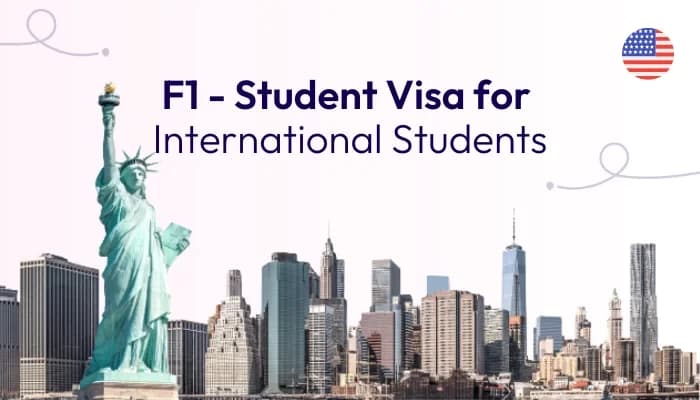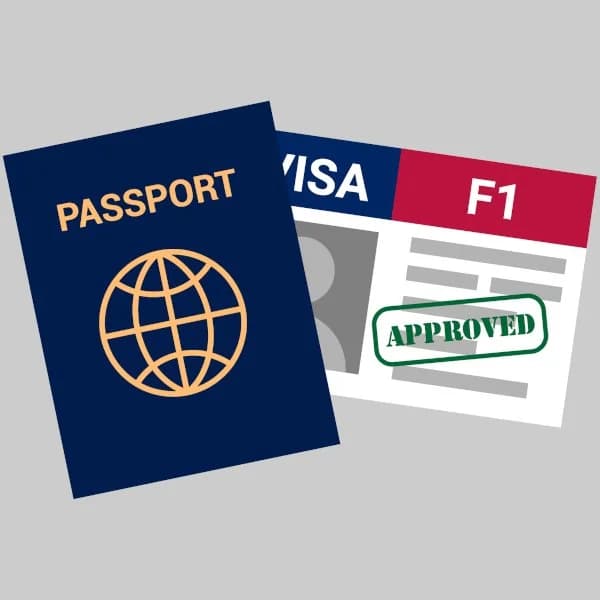F1 Visa Interview: What is your expectation from the course?

Key Highlights
- Understand the depth and intent behind the course expectation question.
- Identify your academic and career goals.
- Highlight specific components of the course that excite you.
- Illustrate how the course aligns with your future career goals.
- Showcase your passion, preparation, and the potential impact of your studies.
Picture the scene: You're ready for the defining moment, your paperwork neatly organized, your attire perfectly chosen to convey seriousness and ambition, and then it arrives—the question that brings a moment of pause. "What is your expectation from the course?" This seemingly straightforward question carries the weight of your entire journey and aspirations, a decisive moment that could pivot the direction of your visa interview.
But don't worry, you're not alone in this. Understanding the depth and intent behind this question will empower you to construct an answer that not only meets expectations but also highlights your zeal, dedication, and the thoughtful planning that has guided your educational path.
What does course expectation question mean?
When interviewers ask about your course expectations, they're peeking into your vision of the future. They want to understand if you have a clear, realistic idea of what the course will entail and how it fits into your larger academic and career goals. This question helps them gauge your commitment, motivation, and whether you're likely to thrive and contribute positively to their academic community.
Example 1: If you're applying for a Master's in Computer Science, you might say, "I expect to deepen my understanding of artificial intelligence, specifically in machine learning algorithms, as the course offers comprehensive modules on this topic. This aligns with my goal of working on AI-driven solutions for environmental sustainability."
Example 2: For a Business Administration applicant, a good response could be, "I expect the course to equip me with advanced strategic management and leadership skills. I'm particularly excited about the internship opportunities that can provide real-world experience in the US market, aligning with my aim to enhance my family's business back home."
Crafting Your Response: Step by Step
1. Identify Your Goals:
Start with clarity about your academic and career aspirations. Reflect on how the course will help you reach these milestones. This foundation will guide your answer, demonstrating a purposeful choice of program.
Knowing your goals allows you to connect the dots between your ambitions and what the course offers. It shows the interviewer that you have a direction and are choosing their institution as a deliberate step towards your future.
Example 1: "I aim to become a data scientist. This course's emphasis on real-world data analysis projects is precisely what I need to build a robust portfolio."
Example 2: "My goal is to improve public health infrastructure in my country. The course's modules on health policy and management are directly relevant to my career objectives."
2. Highlight Course Features:
Talk about specific components of the course that excite you. Whether it's the curriculum, faculty, research opportunities, or the campus culture, show that you've researched and understand what makes this program unique.
This demonstrates not only your enthusiasm for the course but also that you've invested time in understanding what sets it apart. It reassures interviewers that your choice is informed and intentional.
Example 1: "I'm particularly drawn to the course for its state-of-the-art labs and the chance to work under Professor Smith, whose work in renewable energy I've long admired."
Example 2: "The course's partnership with leading tech companies for internships offers unmatched exposure to the industry's best practices."
3. Connect to Your Future:
Illustrate how the course is a stepping stone towards your career goals. Make it clear how this academic experience will equip you with the skills and knowledge necessary to succeed in your field.
This part of your response showcases your ambition and foresight. It tells the interviewer that you're not just thinking about the next few years but are invested in a trajectory that begins with this course.
Example 1: "Learning advanced project management techniques here will prepare me for my goal of leading innovative tech projects, bridging the gap between development and deployment."
Example 2: "The course's focus on sustainable business practices will be crucial for my aim to implement eco-friendly operations in my family's business."
Sample Answers
Now, let's put it all together with three sample answers that encapsulate everything we've discussed.
Sample Answer 1:
"From this course, I expect to gain in-depth knowledge of software engineering principles, particularly in agile methodologies, which are essential for my goal to lead a development team. The course's collaborative projects and internship opportunities will provide practical experience, bridging my academic learning with the demands of the tech industry. This aligns perfectly with my career aspiration to innovate in software solutions for healthcare."
Why This Works: This answer clearly outlines educational and career goals, highlights specific course features, and demonstrates an understanding of how the program will facilitate the applicant's ambitions.
Sample Answer 2:
"I anticipate this program will strengthen my analytical and financial modeling skills, critical for my ambition to work in investment banking. The course's unique offering of real-life case studies and access to a network of industry professionals provides a practical learning environment. This hands-on experience is crucial for my transition from academic learning to making impactful decisions in the financial sector."
Why This Works: It showcases a direct correlation between course offerings and the applicant's future career plans, emphasizing practical skills and professional networking.
Sample Answer 3:
"My expectation is to develop a comprehensive understanding of environmental policy and management, leveraging the program's renowned research facilities and faculty expertise. These resources are vital for my goal to contribute to sustainable urban development projects in my home country. The curriculum's emphasis on sustainable practices and fieldwork aligns with my vision of creating greener cities."
Why This Works: The response connects personal and professional aspirations with the course's specific strengths, showing a deep commitment to both academic and societal goals.
Conclusion
Your response to "What is your expectation from the course?" is more than just an answer—it's a narrative that connects your past achievements, present ambitions, and future goals. It's an opportunity to showcase your passion, preparation, and the potential impact of your studies on your career trajectory.
Remember, the key to a successful F1 Visa interview lies in demonstrating your genuine interest, detailed research, and the strategic alignment of your course choice with your larger life goals. Be authentic, be specific, and most importantly, be yourself. Good luck!
Have Questions About This Topic?
Join our community to get personalized advice and share experiences with others going through similar visa processes.





